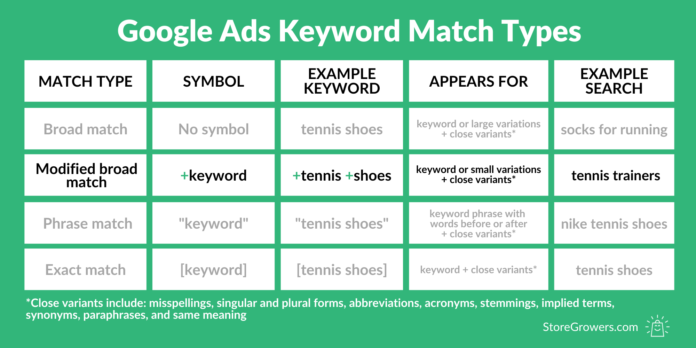Introduction
There are keyword match types that one needs to pick while setting the ad campaign characteristics. Broad Match Modifier and Phrase Match are two such types. BMM allows to cover a wider audience, and the phrase match offers better focus. Let’s look at situations where either of these proves to be more effective and relevant to the advertiser’s purpose.
Background
When you plan to use Google Ads to start a digital ad campaign, you need to overcome the challenge of picking the right keywords. Having the best keywords in your cart can turn the ad strategy in a profitable direction. Not having it can drain the whole advertising budget giving you nothing in return except a few meaningless clicks. It is that crucial to have the correct keyword type in your advertising plan!
Google Ads offers readymade keyword types to ease your pain of using the ad budget according to your advertisement plan. It proposes that reading the audience’s search habits can give a fair overview of keywords useful for meeting the advertisement campaign’s objectives. The two that we will discuss in detail (as mentioned in our title) are nothing but the keyword match types. Are there any other keyword match types too? The answer is yes, and here is a quick recap of all the match types:
- Exact keyword match: Very restricted reach, and entirely focused ad campaign, suitable for a niche audience
- Phrase match: Use of phrase rather than keywords, a bit broader reach, but may show some irrelevant results too
- Broad match: A more generic keyword used, wider reach, but may deliver fewer successes in terms of relevant clicks
- Broad Match Modifier: A little more focused than broad match and a little less generic than the phrase match, has the medium reach and medium relevance.
Let’s pick the two of these phrase match and broad match modifier and try to learn as many things as possible about these. There has been a recent update from Google, which has brought these two keyword matches at the forefront of the advertisers’ attention. Google says that phrase match and broad match modifiers will be matched with other keywords and phrases that imply the same meaning, too. It is expected to give a boost of 3-4% in conversions to the advertisers.
Phrase match vs. Broad Match Modifier – Which one to use when?
When you want the customers to reach you by your brand name and do not want your result to get clamored by other unwanted options, phrase match is the better choice. Even before picking one from these, you must know what these matches look like.
Phrase match reads like (hypothetical example) – Opera House Auditorium
Broad Match Modifier is structured as – +Opera +House
Now, when you use ‘+,’ all other businesses also appear in the search results that have opera. So, the searcher is left to deal with so many unwanted results. But, when you use the phrase match, the customers who are looking for Opera House Auditorium are more likely to find your business in the search results. So, not only will the results be quicker, the customers will find it conveniently time-saving too. As a business owner, you reach the audience without struggle and do not face much competition. Hence, the phrase match works best when the business and audience are pretty sure about each other.
Broad Match Modifier apparently works in searcher’s favor more. If people raising a search query are unsure about their service providers, they want multiple kinds of results to appear.
To tap such customers, the businesses can use BMM and appear in all the results where Opera or House forms the search key phrase. So, despite the competition, the business is more likely to catch customers’ attention when they find your name appearing mostly in all results.
Use of long-tail keywords in the Ad account – How BMM and phrase match fare
A long-tail keyword example is – women handmade rings. When the phrase match condition is chosen, your ad will appear in results only when each word of the phrase matches the query. Means, your business will show up on the front page of search results only when the query made is Women handmade rings.
But, in the case of BMM, where you choose the match type as +women +handmade +rings, your business will appear in all query styles, comprising – handmade rings for women, best handmade rings for women, online handmade rings for women, handmade rings gift for women, and so on. So, when you want to cover a wider audience using long-tail keywords, you can do better with BMM instead of phrase match.
Other cases where BMM will help more
When you want to avoid putting too many negative keywords in your ad account, you can select phrase match type. Phrase match can work better when your aim is not to put too much energy into researching negative keywords. Also, for a starter, this match offers a safer bet. Since BMM covers more search queries, it may require in-depth research as regards negative keywords. Your list of negative keywords will be quite long, and accordingly, you need to increase the advertising budget.
Want to do Ad testing? BMM is the help you need
Phrase match gives only one type of keyword combination to test the quality of the ad. So, nothing much is available to test. The purpose of ad testing is to find the best and worst-performing ads. The best performing ads can be found when lots of keywords or phrases are available to test. The BMM offers the right resource to do ad testing. Once the bad performing keywords are found, these can be added to the negative keywords list, or some other better approach can be adopted.
Conclusion
Google Ad account can contribute to your ad campaign’s success provided you know about the keyword match types, good keywords, bad keywords, etc. When you want to choose between BMM and phrase match, you must understand your purpose clearly. In some cases, the BMM is the right choice, while in others, phrase match serves the need better.












